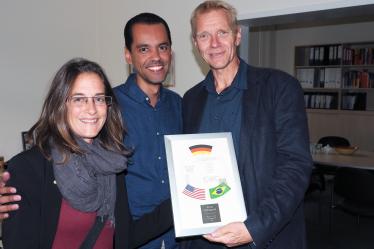C³M says Goodbye to Robin Mays and Roberto Rocha

Due to the ending of our Marie Curie Last ITN "NITIMesr" project we had to say Goodbye to Robin and Roberto last Friday. We are so greatful for our intense and constructive collaboration over the last couple of months. Based on the achived research results the whole C³M team is confident to have many reunions in the near future: we are looking forward to the next steps of our collaboration in context the human centered evaluation of information systems and in the area of community engagement in crisis management. The first occasion to present our intermediate results will be at the 1st IFIP Conference on Information Technology in Disaster Risk Reduction in Sofia next month. Next occasions will follow very soon!
@Robin and Roberto: Thank you very much for being part of our team and, as you see, we consider you not as Alumni but "just" as C³M's Seattle and São Paulo branches!

